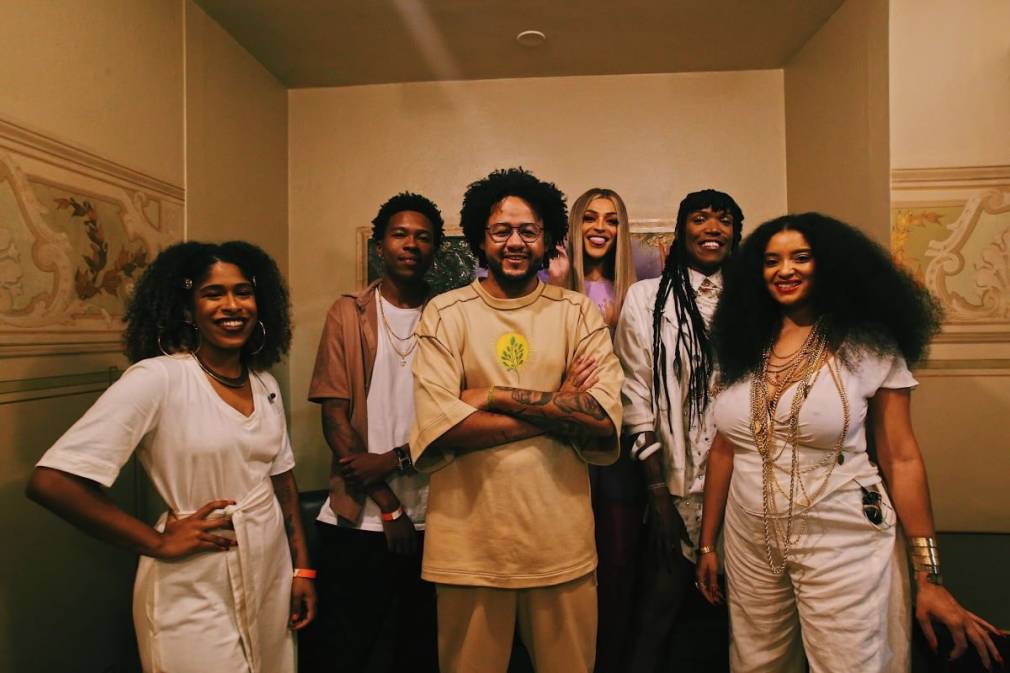An inspired rapper and activist campaigning for racial and social justice, Emicida releases a collaboration with legendary tropicalist artist Gilberto Gil, bringing his message to screens around the world with his new documentary Netflix AmarElo: It’s All For Yesterday with Gilberto Gil, Pabllo Vittar, Marcos Valle, Maria Bethania, Wilson Das Neves and Zeca Pagadinhow.
A hip-hop star and veteran activist, the Brazilian MC had just won a Latin Grammy when he unveiled a Netflix documentary about black Brazilian music. It marks a small revolution on the global platform which, for the first time, offers real visibility to black artists in Brazil’s long musical history. While offering a fantastic samba lesson, the documentary gives a voice to marginalized people by including, for example, the trans singer Pabllo Vittar, in order to allow all black Brazilian artists a greater sense of expression. The documentary takes place during a series of live performances that Emicida recorded at the Teatro Municipal de São Paulo for the release of his album AmarElo in February 2020. It is a place that is highly symbolic in the celebration of the rich heritage of black Brazilian culture, since the venue would never have existed without their combined strength. Paradoxically, very few Afro-descendents in Brazil attend this theatre today due to of the racism that plagues society.

For those who do not know him, Emicida, whose real name is Leandro Roque de Oliveira, released his album in February 2020, just before the world came to a standstill. It contains tracks with guests such as Ibeyi, Zeca Pagodinho, Marcos Valle, Majur and Pabllo Vittar, who won a Latin Grammy last November. The hip-hop artist has delivered a message of tolerance and love without no matter someone’s colour, social class or religion. His documentary is the culmination of this struggle, a journey to the heart of black music in a Brazilian context – music that has played a very important role in the cultural construction of Brazil but which has been left out of school textbooks. For those who have come to know Brazilian music through the selections of Gilles Peterson or Madlib, this documentary is a waking dream. It contains incredible images of legendary Brazilian samba musicians such as Wilson Simonal, Wilson Das Neves and Maria Bethania, the idea being for Emicida to build stories by putting the black people of Brazil back into their own history.

To top it all off, Emicida collaborated with Gilberto Gil – another hero of his documentary and former Minister of Culture in Lula’s government between 2003 and 2008 – on the video for “É Tudo Pra Ontem.” Along with Caetano Veloso, Gilberto was at the forefront of the tropicalist counterculture movement of the 1970s. “É Tudo Pra Ontem” is a slow piece of life affirmation. Gil recites a poem entitled “A vida não é útil” (Life is not useful) from a book written by the great Brazilian indigenous leader, philosopher and poet Ailton Krenak. Emicida and Gilberto Gil both sing in Portuguese and this is the first time that these two artists, from two different generations, have come together to write a new Brazilian cultural narrative. “The worst crime is to let my traumas define me. Doing so, we give the trophy to our enemies” AmarElo, Emicida.
Discover the documentary Emicida: AmarElo – Yesterday and Now on Netflix here.
Listen to Emicida and Gilberto Gil in our Songs of the Week playlist on Spotify and Deezer.



